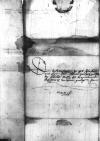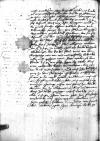Dem Hochwirdigenn yn Gott Furstenn und Herrrn, hern ⌊Johann von Gots gnaden des löblichen stichts czu Ermelannde bisschove⌋ etc., unnserm gnedigenn hernn
Hochwirdiger in Gott Furst, / Gnediger Herrr.
Unnsere bereitwillige unnd unvordrossene dienste / seint Ewer Hochwirdigste Gnade bsundern vleisses czuvorn entpholen. /
Gnediger Herrr. /
Es hott unns unser vilgeliebter burgermeister / der eddele und bestrenge her ⌊Johann von Werden⌋ / ufs ⌊Newburck⌋ und ⌊Preuschenmarckt⌋ heuptman vormeldeth, / das Ewer Hochwirdigste Gnade nicht vor guth und radtsam angesehn habe. / Dweil sich der czuck der verordenten batten des landes vorczeucht, / das sich die unsernn von den andern herren geschicktenn sundern / unnd also in unsern private ⌊stadt⌋ geschefftenn / die wir ⌊seine gnade⌋ auf
<e>
rlegt / an die ⌊junge konigliche maiestet⌋ begeben thette ... viewol wir solchs alles yn unnsern radtschlegen bey uns bewogen. Dweil wir aber aus den ursachen / wie gemelter unser lieben ⌊burgermeister⌋ uns anczeiget / Ewer Hochwirdigste Gnade erczelet hab. / Auch weitter der erbar unnd namhaftige her ⌊Jurgen Schevcke⌋ / unser obligen / Ewer Hochwirdigste Gnade berichtenn wirt / nicht sehn / wie wir ane ungelimpt und koniglicher ungnade / die ⌊junge konigliche maiestet⌋ unser allergnediger herr czubeschicken nochlossenn mögenn. / Dweil wir eygentlichen berichtet seint, / das ihre ⌊konigliche maiestet⌋ gereth ethwan nicht geringe arckwanickeit(!) jegenn unns / aus dem vorfasseth hott, / das solche bothschafft von uns vorm jare nicht vortgegangenn ist. / So wie wir dassmol vorgehabt / ihrer koniglichen maiestet bey kommenn ist. Dweil aber aus vilen ursachen unsers erachtenns / die wir unserm obgemeltenn lieben ⌊burgermeister⌋ czugeschrieben / auff weitter erwegen Ewer Hochwirdigste Gnade czuvormelden / und unsers erachtens nicht unradtsam were / do yo der czuck noch ⌊Craka⌋ yn einen aufsthub gelangete, / das der yn ⌊Littawen⌋ yo czum wenigsten abgelegt were. / Derwegen ist unser dinstlich unnd fleissick bith, / es wolle Ewer Hochwirdigste Gnade sich dissmol durch uns dohin bewegenn / unnd in der gnade finden lossenn / und dem ⌊hernn vonn Colmensehe⌋ / sampt dem hern ⌊marienburgischen woywoddenn⌋ gnedicklich schreibenn, / das sie sich dissmoll nuth dem landes befehlich / ann die ⌊junge konigliche maiestat⌋ czuczihen bekemenn / und den selbigen bey seine jungen koniglichen maiestat ablegenn woltenn den so Ewer Hochwirdigste Gnade in mitlerczeit von ⌊Krake⌋ bescheide uberkumpt / das die ⌊konigliche maiestet⌋ unns vor dem ⌊reichstage⌋, / wie wir aus mennicherley bedencken achten nicht gescheen wirt / hoen wolte. / Als dann konnte Ewer Hochwirdigste Gnade uns solchs jegen der wille durch einen reittenden botten vormeldenn, / das wir von do ab vortczögenn. / Do auch ihre ⌊konigliche maiestet⌋ unns in dem ⌊reichstage⌋ czuhörenn auffschube / so were yo der wegk geendt / und konnen mith mehrem fugk unnd bekennickeit. / Auch vorhuttunge unnuczer czerunge alhier von haus jen ⌊Krake⌋ / den von hin in ⌊Littawenn⌋, durch Littawenn jen Kraka geczogen wurden / welchs wir alles Ewer Hochwirdigste Gnade ihrem vonn Gott / hern furstlichen verstannde noch / czuer wegenn / wollenn ann heim gesseczt habenn.
Die wir hiermit dem liebens Gott inn lange leibs gesu[ntheit] unnd glucksseliger regierunge thuenn entfehlenn.
Datum ⌊Danczick⌋, 2 Iulii anno 46.
Ewer Hochwirdigste Gnade dinstwillige ⌊burgermeistere und radtmanne der koniglichen stadt Danczick⌋



